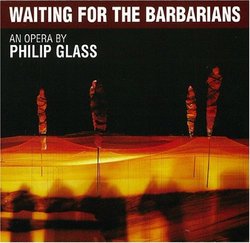Opera Grows Up
Marvin Cohodas | Vancouver, BC, Canada | 06/04/2008
(5 out of 5 stars)
"Philip Glass and librettist Christopher Hampton have adapted J. M. Coetzee's parable about power and inhumanity in an opera that staggers in both dramatic power and beauty. The story is set in a town on the fringes of a nameless Empire that is in the process of expanding over the lands of wandering peoples called The Barbarians. As settlers encroach on grazing lands, the Barbarians are led to raid a few cattle, the same solution that Native Americans were forced into as European settlers forged westward. The Empire's response is very contemporary, however, fabricating a threat and confirming it through "confessions" made under torture. As the army takes over and terrorizes the town, its inhabitants are fanned into a frenzy of fear that allows them to accept militarization as normal and necessary. The town's Magistrate is overwhelmed by both guilt and confusion which he attempts to assuage by befriending the Barbarian Girl, a young woman who had been partially crippled and partially blinded by the torture. When the Magistrate returns the Barbarian Girl to her people, he is accused of treason for aiding the enemy, and he is himself imprisoned and tortured, a process he accepts as both expiation and education. When the army, defeated by the desert, abandons the town, a wiser Magistrate begins to lead the people back to normalcy imbued with a new sense of justice.
The musical style of Waiting for the Barbarians is far removed from that of Philip Glass's famous early trio of operas, Einstein on the Beach, Satyagraha, and Akhnaten, since it relies on a continuously moving dramatic narrative rather than set pieces. The orchestration is ravishingly melodic with amazingly varied orchestral colours, against which the vocal line provides a counterpoint. In evidence here is Glass's ability to paint pictures with music, a skill honed on the text-less films of Godfrey Reggio, as when it describes an imperial garden or a buck deer drinking at a pond.
This combination of melody and colour also paints vivid pictures of the content of the action that is never more powerful than when it brings out the unstated subtext. For example, the Magistrate's act of unwrapping the bandages on the Barbarian girl's feet to examine the damage is accompanied by rapturous music of almost unbearable beauty. In his next scene with the Barbarian Girl, the Magistrate chats with her simply about her work and living conditions at the same time that he bathes her, and again music of swirling intensity brings out the emotional connection that the bath implies.
Christopher Hampton's libretto brilliantly condenses the novel into a series of scenes, including the novel's dreamscapes as orchestral interludes that allow a meditative pause between the dramatic events. The characters are also carefully drawn by differences in language. Colonel Joll, the expedition leader and "interrogator" is ultra-refined (his music is slithery-slick) while his foil and henchman, Officer Mandel, is brash and crude. Likewise the Magistrate is overly introspective and intellectual while his foil, the Barbarian Girl is matter-of-fact.
Hampton has also made a few changes in the plot and characters to bring out the kind of closure that is useful in the dramatic arc required of an operatic performance. He has joined the character of the cook and her daughter into a single person. The opera's cook appears to be secretly attached to the Magistrate and stands by while he repeatedly has sex with Star, the woman he can't love, and develops a love relationship with the Barbarian Girl, the woman with whom he is reluctant to have sex. But as in Goldilocks and the three bowls of porridge, he ultimately realizes that the cook is "just right."
The opera ends on note of hope on multiple levels. The Magistrate has expiated his guilt over complicity in the torture and abuse of the Barbarian prisoners at the same time that he has begun to figure out what it means to be human. On a larger scale, as the vile agents of the empire are defeated by their own arrogant stupidity, the community has learned something about justice and how irrational fears of an "Other" are used to manipulate people into betraying their most basic values. The latter, of course, is a lesson North Americans desperately need to learn. But it is important to remember that this operatic drama works on multiple levels, all explored brilliantly through text and music, and thus cannot be simply reduced to a political statement. The action speaks for itself, so that the text and music bring out the humanity of the characters and the universality of their situation and the choices they make.
There is thus a great deal to both ponder and enjoy in this opera. Even more than Satyagraha, Waiting for the Barbarians demonstrates how opera can be not only relevant in the 21st century but also a force for social change. Waiting for the Barbarians is opera "grown up"!"


 Track Listings (15) - Disc #1
Track Listings (15) - Disc #1